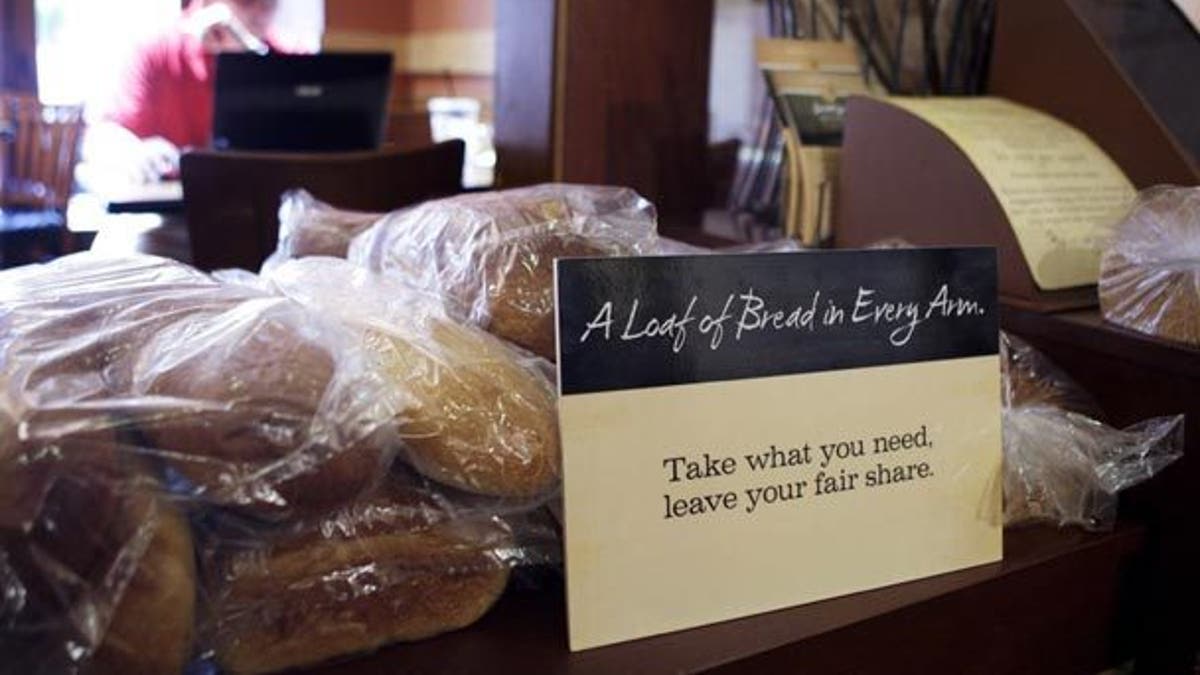
Panera Bread restaurant allows customers to pay what they want. (AP)
"Your suggested donation today is $6.59," said a woman taking orders behind the counter at a Panera Bread Company restaurant in Dearborn, Mich.
It's a “suggested donation,” not a price, because although this looks just like a typical shop in the restaurant chain -- with all the same sandwiches, soups and salads you would see in a standard Panera property -- there’s a difference here.
At this location, there are no actual prices. You pay how much you want, or what you can afford.
Panera is marking the anniversary of when began its experiment with nonprofit restaurants, run by the company’s charity arm, Panera Cares.
Various types of nonprofit restaurants, which are known as “Robin Hood restaurants” because the purpose is for those who have more to help out those who have less, are opening up around the country in response to the down economy.
With the latest unemployment numbers from the Bureau of Labor Statistics showing more than 14 million people in this country still without work, Robin Hood restaurants are helping fill a void.
“I don’t have a job right now so it's good to know that I can still come here and get food even if I don’t have the money,” said Robin Maywood, who gave the suggested donation for her turkey and cheese sandwich.
Some customers, like John Kubica of Rochester Hills, Mich., dropped in a few extra bucks.
"The sandwich-and-soup combo I got was $6. I donated $8. I try and give the most that I can.”
Right now Panera operates three nonprofit restaurants around the country. In addition to the one in Dearborn, there’s one in the St. Louis area and one in Portland, Ore.
"The theory is that we can build a community that will support this. That the people with means will pay ... those without don't have to feel bad about coming in and having their meal. We've even given out options for people who don't have anything to donate, to donate by spending an hour with us by helping out in the bakery cafe,” Lee Carmona, a district manager for Panera Bread Company, said.
It’s the same concept at Cafe 180 in Englewood, Colo.
“We either ask people to donate an hour of their time, donate what you would normally pay for a meal like this or donate extra to pay it forward,” a cashier at the nonprofit diner said.
Cafe 180 posts its mission statement as “dedicated to eliminating hunger and social barriers associated with food by feeding all people regardless of their ability to pay, in a dignified and respectful manner.”
Todd Tillapaugh is one customer who took up the cafe on its offer to exchange his time for a free meal.
“I think it’s a great concept and a great opportunity for people to eat together no matter what economic situation they’re in," he said
Pay-what-you-want restaurants have opened around California, Utah and Florida as well. Several more are in the works.
Panera says 60 percent of its customers pay the suggested amount, 20 percent pay more and about 20 percent pay less.
"Donations are literally allowing us to be self-sustaining. ... Any revenue that we can generate above our costs will go towards a program that will bring in at-risk youth. We'll do some job training for them, maybe help support some life skill training for them and then get them back out in the community, like Panera Bread or another place they can work," Carmona said.
While many customers said they supported the concept, some did admit it made them a little uncomfortable. There are donation boxes in front of every cashier stand which some said made them feel obligated to pay more for their meal.
“It's like peer pressure” said customer Tukua Chatmen, who was embarrassed to tell the cashier she only wanted to pay the suggested amount.
"The look on the cashier's face, was kind of like, well, you were being pressured.”
When a popular chain like Panera decides to set up nonprofit restaurants, it can be a successful marketing scheme for the company, as it shows that it's doing something to help those hurt by the economy, but it can also backfire, said DePaul University marketing strategist Joe Marconi.
"If Panera or any company is going to run a promotion like this and wants to be able to claim, as this company has after a year, that it is very successful, they have to be able to show the results," he said. "They need to be able to come out with a statement that said, here is the dollar volume that was generated, here is how much we gave to the cause, here are the causes we have supported. If they don't do something like that, then the customer will be very wise to question where that money is going."
Critics have suggested that those who really want to help people in need should just donate to their local soup kitchen rather than adding a couple of bucks to the cost of their meal, but "we certainly aren't trying to replace the soup kitchens,” Carmona counters.
“Everyone serves their purpose, but we want to provide the Panera Bread experience to those who are really struggling right now and hope that the community gets involved with it,” he said.
If the pay-what-you-want restaurants in the Panera chain can continue to support themselves, as well as bring in a bonus for charity, the company may open more locations, which could be a win for Panera in the publicity department and a win for those in need right now.
Since the Robin Hood restaurant concept is dependent on those willing to give a little more, a continuous downward spiral in the economy could make or break them.








































